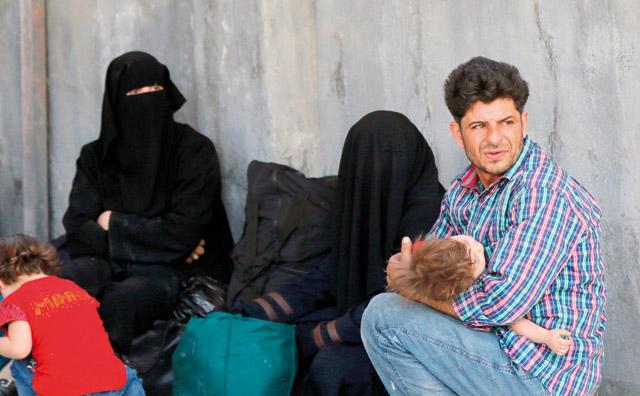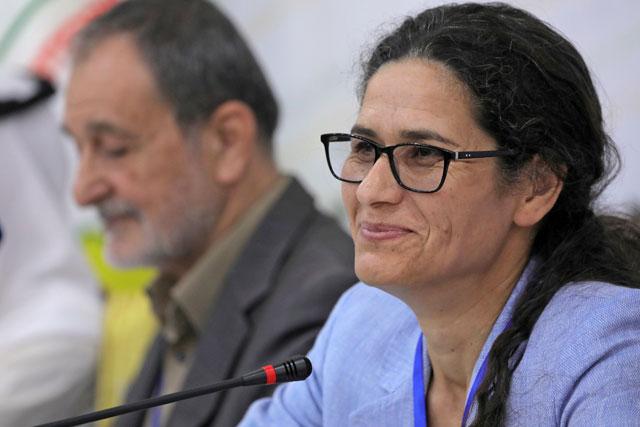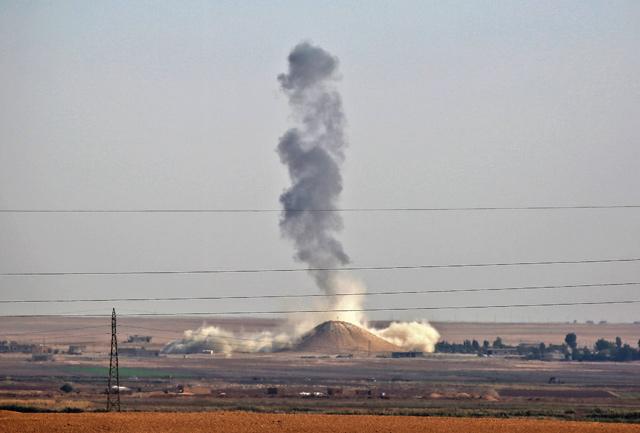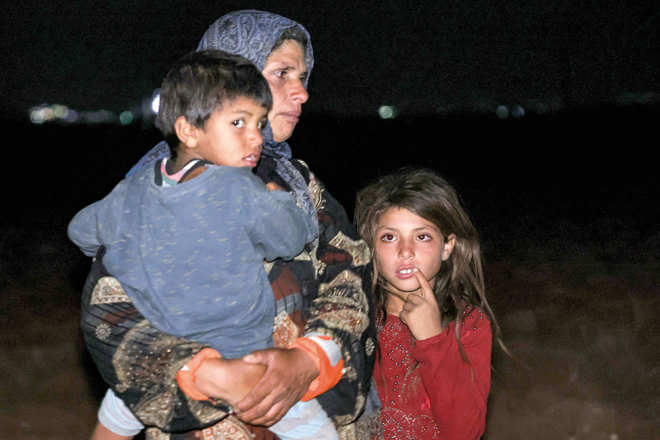You are here
In Syria, a bus ride shows shifting map of war
By Reuters - May 19,2017 - Last updated at May 19,2017

Residents of Al Qaboun, a formerly rebel-held northeastern suburb of Damascus, wait in an area designated by the Syrian government for their cases to be processed after the suburb was retaken by regime forces, on Tuesday during a tour guided by the government forces (AFP photo)
QAMISHLI, Syria — A new bus service linking Syria’s Kurdish-controlled northeast with the government-held west, unthinkable before Daesh was driven from the area, is raising hopes of renewed commerce between two long-estranged parts of a fractured country.
Kurdish-led authorities hope the new corridor will end the economic isolation of their region, bordered as it is by hostile parties. For Damascus, the corridor holds out the prospect of sourcing fuel and food from the resource-rich northeast.
The service from Kurdish-controlled Qamishli to Aleppo city goes through territory captured from the Daesh terror group by Russian-backed Syrian government forces in February. Until then, only an intrepid few would make a journey that entailed crossing through areas held by Daesh and competing rebel groups.
“Before, there were no passengers, very, very few, because of the security conditions,” said Ahmad Abou Abboud, the head of Qamishli office of the bus company that started the service in late April.
Demand has risen steadily since the first busses — sleek, white, air-conditioned coaches with purple curtains — went into operation. Weekly trips have increased from two to three, Abboud told Reuters in Qamishli.
A Kurdish official said so far the road was being used only for travel, not trade.
The new bus service is the result of one of the most important shifts in the map of the Syrian conflict in recent times, with the areas controlled by government forces and Kurdish-allied militias being linked up near the city of Manbij.
Historic enmity
It points to the highly nuanced state of relations between the Damascus government of President Bashar Assad and the Kurdish authorities that have established control over wide areas of the north since war began in 2011.
Despite historic enmity, Syria’s Kurds and government have seldom clashed. They have also found themselves fighting the same adversaries in the civil war in areas where their military interests have converged, including Turkey-backed rebel groups.
Its critics say the main Kurdish militia, the YPG, has cooperated with government forces. The YPG denies this.
The newly opened route passes west from Qamishli through a swathe of territory held by the Syrian Democratic Forces (SDF), an alliance of militias dominated by the Kurdish YPG. Much of the SDF-held territory was captured from Daesh with support from the U.S.-led coalition.
The SDF-held region meets areas held by the Syrian government and its allies to the south of Manbij.
“We heard about this route in the media, after that we knew it was opened,” Abou Abboud said. “We were in contact with the relevant parties, and we have contacts with all parties — the regime and the autonomous administration.
“The two sides facilitated it.”
Abdul Karim Saroukhan, head of the Kurdish-led administration in northeastern Syria, said the bus route was a private initiative, and not sponsored by the government he runs from the city of Amuda 30 km from Qamishli.
Speaking to Reuters, he said the route had yet to be used for commerce. In a Reuters interview in March, Saroukhan expressed hope the route would end the economic “siege” imposed on his region, which is bordered to the north by Turkey and to the east by the Iraqi Kurdish administration - both of which are hostile to the nascent Kurdish government in northern Syria.
Syrian government officials could not be reached for comment. An official in Damascus however said the bus service was a positive thing and suggested it had government approval.
“Any move that helps geographic contact between Syrian regions with the knowledge of the Syrian state is viewed as a helpful, good thing, and helps to restore life to normalcy,” said the official, who spoke on condition of anonymity.
Both sides have recently hinted they could be ready to reach a political accommodation. The Kurdish YPG militia has said it would have “no problem” with the government once Kurdish rights were secured, and the Syrian foreign minister has expressed confidence an “understanding” could be reached.
The YPG has allowed the Syrian government to maintain control over pockets of territory in the northeast, including Qamishli airport from which flights go to Damascus.
The government has meanwhile allowed the YPG to maintain control of a Kurdish neighbourhood of Aleppo city.
Suspicion lingers however as the sides promote conflicting visions for Syria’s future. The Kurdish groups and their allies in the north want to preserve their autonomy in any peace deal, and promote a federal model for Syria.
Assad, who controls swathes of western Syria, has repeatedly said he wants to bring all the country back under government rule, and last year dismissed the local governance created in Kurdish areas as “temporary structures”.
Related Articles
TABAQA, Syria — The political arm of the Syrian Democratic Forces (SDF) militia said on Monday it would work to set up a unified administrat
BEIRUT — Kurds, among the biggest winners of Syria's war, stand to lose most from a US decision to withdraw forces who have helped them batt
BEIRUT — Fighters loyal to the Syrian government have clashed with Kurdish-led forces in a mainly Arab district of eastern Syria, leaving 25



















